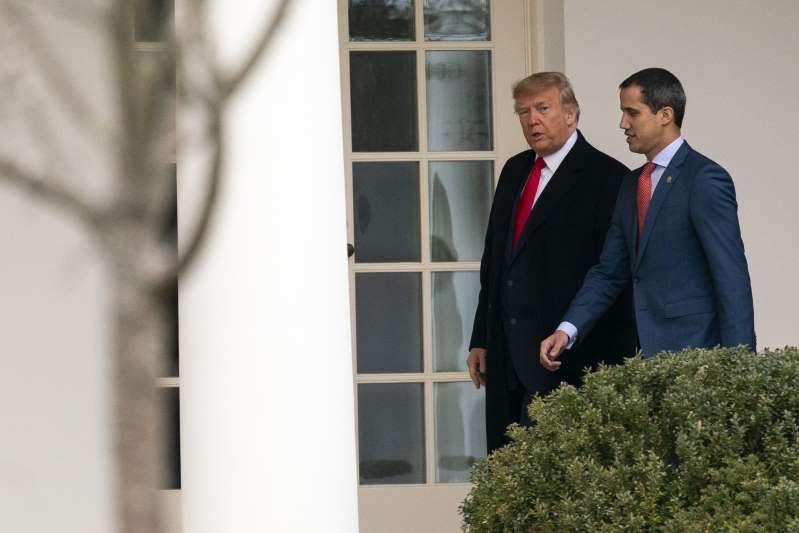Venezuela's Juan Guaidó meets with Trump at the White House

Venezuela’s opposition leader, Juan Guaidó, got a big push Wednesday, when he met with President Donald Trump at the White House for the first time since he recognized the young leader as the legitimate president of the South American country.
The meeting comes a day after Guaidó attended the State of the Union address Tuesday night as a guest of the White House and received a standing ovation when Trump introduced him as Venezuela’s “true and legitimate” leader. His attendance came as a surprise to many since his name was not listed as one of Trump’s guests. Guaidó had been seeking to meet with Trump for some time.
A senior administration official pushed back on speculation that Trump had lost faith in Guaidó and was invited at the last minute. The official said when Guaidó left Venezuela the administration felt it would be a good opportunity to invite him and it had been approximately two weeks in the works. The administration had kept a close hold on the plans.
The official said there will be impactful measures within the next 30 days aimed at crippling Venezuela's current government under Nicolás Maduro.
During the address Tuesday, Trump told Guaidó, “Mr. President, please take this message back that all Americans are united with the Venezuelan people in their righteous struggle for freedom.” He said Maduro's “grip on tyranny will be smashed and broken.”
Venezuelan Foreign Minister, Jorge Arreaza told reporters Wednesday morning that Trump is an “arrogant charlatan” and criticized the speech as “interventionist rhetoric.”
The senior administration official said Venezuela is a national security priority because of the destabilizing effect it has on its neighbors. The Trump administration is at best, halfway to achieving maximum pressure on Maduro and his government, said the official.
“Everything is an option,” to create pressure said the official, “whether it’s towards Russian entities that are supporting Maduro or others.”
Earlier on Wednesday, Guaidó met with Vice President Mike Pence, Sen. Marco Rubio, R-Fla, Chairman of the Senate Foreign Relations Subcommittee on Western Hemisphere, as well as other Republican senators at the Capitol.
Congressional Democrats, who also oppose Maduro’s government, criticized the administration's approach after the meeting.
Senator Chris Murphy D-Conn, tweeted that “Trump's Venezuela policy has been an utter failure, empowering Maduro and weakening the U.S. in our hemisphere and the world.”
He went on to say “some of us counseled holding back recognition of Guaidó as leverage to get Maduro to make concessions. But Trump played his most important card on day one, leaving him no room to maneuver.”
Speaker Nancy Pelosi will hold a photo opportunity with Guaidó on Thursday.
Despite support, no change yet
In January 2019, Guaidó invoked the constitution as a legislative leader to assume interim presidency and declared Maduro a usurper. Maduro’s 2018 reelection, in which key opposition figures were barred from running, was rejected by the legislature, the U.S. and the European Union, among others.
The Trump administration was the first, among nearly 60 countries, to throw its weight behind Guaidó. Since then the U.S. has become Guaidó’s most important international ally. The Trump administration has sanctioned the state-run Venezuelan oil company PDVSA and taken other measures to pressure Maduro out of office.
Guaidó has not been able to deliver the change in Venezuela he has promised, and Maduro remains in power with military backing and control over most branches of the government.
Guaidó defied a travel ban and slipped out of Venezuela on Jan. 19, stopping in Colombia, Europe, and Canada with the aim of shoring up support. He met with world leaders, including British Prime Minister Boris Johnson, French President Emmanuel Macron and Canadian Prime Minister Justin Trudeau.
Guaidó held a rally in Miami on Saturday, home of the largest community of Venezuelans in the country. Florida is an important swing state for Trump in order to win reelection in 2020.Venezuela, once one of Latin America’s wealthiest countries with vast oil and mineral resources, has been roiled in economic and political turmoil in recent years because of decades of corruption and mismanagement. Trump administration sanctions that prohibit exports of oil to the U.S. have not helped.
The country of 30 million people has the highest inflation in the world. Most of the country suffers from shortages of gasoline, running water, electricity and other basic services. An estimated 4.5 million Venezuelans have fled the country in recent years, comparable to war-torn Syria.
Photo: © Evan Vucci President Donald Trump walks to a meeting in the Oval Office with Venezuelan opposition leader Juan Guaido at the White House on Feb. 5, 2020.











